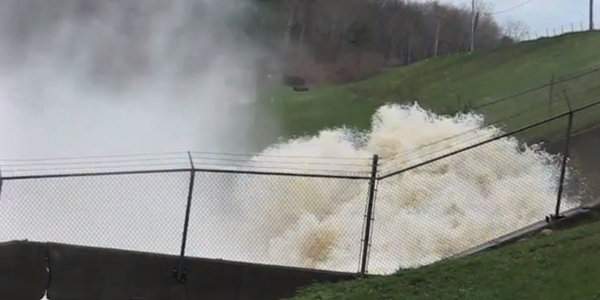By Amanda Durish Cook
FERC last week said that it will not delay its decision to shut down a Michigan hydropower dam over safety violations.
The commission ruled there was no reason to grant a stay of its order to revoke the license of the 4.8-MW Edenville Dam in northern Michigan, saying it only allows such a delay in cases of “irreparable injury” to the petitioner (P-10808-062). In this case, the commission said it found no harm other than economic loss.
FERC ordered the dam shut down in February, citing concern over a failure of owner Boyce Hydro to increase the dam’s spillway capacity. (See Michigan Dam Ordered Shut over Safety Breaches.)
Boyce filed for a stay last month, along with the Sanford Lake Preservation Association, the Wixom Lake Association and the Gladwin County Board of District Commissioners, who wanted to take over dam operations. The D.C. Circuit Court of Appeals on Sept. 25 denied Boyce’s motion to stay the revocation order.
In its ruling Thursday, FERC reiterated the dam’s 14-year history of noncompliance and safety violations.
“In multiple orders, the commission has set forth a history, going back to 2004, of Boyce Hydro’s failure to comply with its license, the commission’s regulations and commission orders,” FERC wrote. “The commission’s primary concern has been Boyce Hydro’s ‘longstanding failure to address the project’s inadequate spillway capacity.’ Nevertheless, 14 years after acquiring the license for the project, the licensee has still not increased the project’s spillway capacity. The licensee has shown a pattern of delay and indifference to the potential consequences of this failure, which the commission has found must be remedied in order to protect life, limb and property.”
FERC also said it was not swayed by the argument by the lake associations and county commissioners that it would be costly and difficult to acquire a new license for the dam.
“Whether Boyce Hydro and the lake associations will reach agreement regarding the sale of the project works is speculative; these entities have not suggested that such a transaction has gone beyond the exploratory stages,” FERC said.
The shutdown is ultimately in the public interest, FERC said, observing that even the temporary state of the dam during spillway renovations would place the public at further risk: “Boyce Hydro … notes that to repair the spillways will require the installation of a cofferdam for four to six months, which will reduce the spillway capacity by approximately 50%, increasing the potential for overtopping of the dam.”




